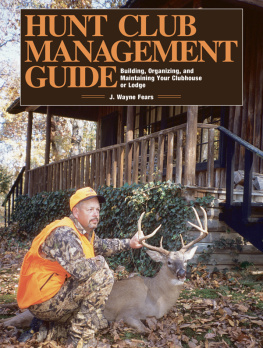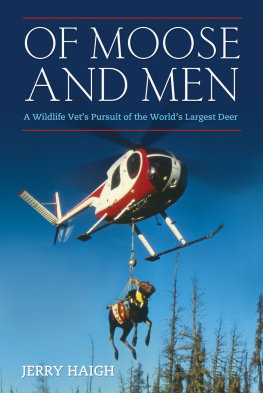Copyright 2003, 2014 by J. Wayne Fears
All rights reserved. No part of this book may be reproduced in any manner without the express written consent of the publisher, except in the case of brief excerpts in critical reviews or articles. All inquiries should be addressed to Skyhorse Publishing, 307 West 36th Street, 11th Floor, New York, NY 10018.
Skyhorse Publishing books may be purchased in bulk at special discounts for sales promotion, corporate gifts, fund-raising, or educational purposes. Special editions can also be created to specifications. For details, contact the Special Sales Department, Skyhorse Publishing, 307 West 36th Street, 11th Floor, New York, NY 10018 or .
Skyhorse and Skyhorse Publishing are registered trademarks of Skyhorse Publishing, Inc., a Delaware corporation.
Visit our website at www.skyhorsepublishing.com.
10 9 8 7 6 5 4 3 2 1
Library of Congress Cataloging-in-Publication Data is available on file.
ISBN: 978-1-62873-690-8
eISBN: 978-1-62914-153-4
Printed in China
Contents










The social value of life around a base camp is an incentive for many hunters to join a hunting club.
It is like owning a place
in the country but
at a fraction of the cost.
INTRODUCTION
I t started in Texas and spread across the South. Then it spread up the Rocky Mountain states. Now they are springing up throughout the United States No, it is not a new chain of taco stands; its the practice of leasing private land by a group for hunting.
Hunters in the United States of today face problems that their forefathers could not have conceived. In their day, hunting lands were easily found, most game species were abundant, and landowners were willing to grant hunting permission to almost any asking hunter. Now, the population explosion has changed all this. Our cities are growing, and the fields and forests that used to be open for hunting are becoming less available. Because of land shortage, hunters are grouping together, forming hunting clubs, to lease hunting rights on private land. If properly done, a membership in a hunting club can be one of a hunters most prized possessions. Improperly done, it can become a nightmare.
I became involved in leasing hunting land back in the 1970s and early 80s, when I managed the Forest Recreation Division of Gulf States Paper Corp., a forest products company in Alabama. The company owns 500,000 acres of forestland that is leased to over 200 hunting clubs.
I saw firsthand the many benefits to hunters of belonging to a club that leased land for hunting. I also saw the advantages the landowner derived from leasing land to hunting clubs. It is a win-win proposition.
These benefits are being realized throughout the United States, as public hunting lands are being reduced annually. Some public lands are crowded and downright dangerous; and on many, quality game management is minimal at best. Urbanization has taken up much of the free land many of us once hunted, and more acreage is threatened.
Therefore, hunters who are serious about their sport are forming clubs and leasing tracts of land from pulp and paper companies, timber companies, utility corporations, and petroleum and mining companies, as well as from farmers, ranchers, and some bank trust departments.

Many hunters join a hunting club in order to have an opportunity to participate in the management of land to produce quality of game to hunt.
Here are some advantages of forming a hunting club and leasing land.
 You can hunt with other hunters you are compatible with and who share your long-term hunting goals.
You can hunt with other hunters you are compatible with and who share your long-term hunting goals.
 You have exclusive rights to hunt your lease.
You have exclusive rights to hunt your lease.
 You can carry out a long-term wildlife management program and enjoy quality hunting for many years.
You can carry out a long-term wildlife management program and enjoy quality hunting for many years.
 By involving yourself in wildlife management practices on the property, you and your family or hunting partners can enjoy year-round activity on the lease. Many lessees find wildlife management activities to be as much fun as the hunt itself.
By involving yourself in wildlife management practices on the property, you and your family or hunting partners can enjoy year-round activity on the lease. Many lessees find wildlife management activities to be as much fun as the hunt itself.
 Through a long-term lease, the next generation is assured a place to hunt.
Through a long-term lease, the next generation is assured a place to hunt.
 The members of many hunting clubs become fast friends and club members become part of an extended family. These hunters enjoy a camaraderie not found in other areas of life.
The members of many hunting clubs become fast friends and club members become part of an extended family. These hunters enjoy a camaraderie not found in other areas of life.
 A hunting lease can be much less expensive than a guided hunt or a hunt on distant public lands that require travel.
A hunting lease can be much less expensive than a guided hunt or a hunt on distant public lands that require travel.
Equal advantages apply to the landowner who leases land to hunting clubs.
 Lessees usually develop a pride of ownership in the land, so they minimize trespassing, wildfires, dumping, illegal woodcutting, and other problems.
Lessees usually develop a pride of ownership in the land, so they minimize trespassing, wildfires, dumping, illegal woodcutting, and other problems.
 The lessor knows who is on his land.
The lessor knows who is on his land.
 The land can bring additional income without interfering with other income-producing sources, such as timber growth or oil pumping.
The land can bring additional income without interfering with other income-producing sources, such as timber growth or oil pumping.



























 You can hunt with other hunters you are compatible with and who share your long-term hunting goals.
You can hunt with other hunters you are compatible with and who share your long-term hunting goals.